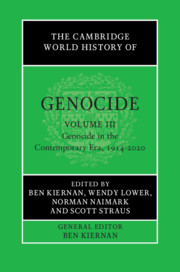Book contents
- The Cambridge World History of Genocide
- The Cambridge World History of Genocide
- The Cambridge World History of Genocide
- Copyright page
- Contents
- Figures
- Tables
- Maps
- Contributors to Volume III
- Introduction to Volume III
- Part I Racism, Total War, Imperial Collapse and Revolution
- Part II World War Two
- 9 From Persecution to Genocide
- 10 Systematic and Ad Hoc Persecution and Mass Murder in the Holocaust
- 11 Jewish Life and Death under Nazi Rule across Europe and around the Globe
- 12 The Nazi Camps and Killing Centres
- 13 State Violence during World War Two
- 14 The Genocide of the Romani People in Europe
- 15 The Nazis and the Slavs
- 16 The Nanjing Massacre
- Part III The Nation-State System during the Cold War
- Part IV Globalisation and Genocide since the Cold War
- Index
13 - State Violence during World War Two
from Part II - World War Two
Published online by Cambridge University Press: 23 June 2023
- The Cambridge World History of Genocide
- The Cambridge World History of Genocide
- The Cambridge World History of Genocide
- Copyright page
- Contents
- Figures
- Tables
- Maps
- Contributors to Volume III
- Introduction to Volume III
- Part I Racism, Total War, Imperial Collapse and Revolution
- Part II World War Two
- 9 From Persecution to Genocide
- 10 Systematic and Ad Hoc Persecution and Mass Murder in the Holocaust
- 11 Jewish Life and Death under Nazi Rule across Europe and around the Globe
- 12 The Nazi Camps and Killing Centres
- 13 State Violence during World War Two
- 14 The Genocide of the Romani People in Europe
- 15 The Nazis and the Slavs
- 16 The Nanjing Massacre
- Part III The Nation-State System during the Cold War
- Part IV Globalisation and Genocide since the Cold War
- Index
Summary
This chapter focuses on Bulgaria, Romania and Hungary. I first consider why state violence has remained on the margins of Holocaust scholarship. Next, I present a historical account and an argument about the settler colonial and genocidal character of state violence during World War Two. This section can offer only glimpses into the events and processes it discusses. I highlight similarities between the settler colonial projects of the three states and how anti-Jewish persecution and violence unfolded as an integral part of these destructive processes, which not only targeted other groups as well but also the very idea of a diverse society. I then explore accounts of survivors, mostly – but not only – Jews, who turn our attention to state violence in a way that challenges global Holocaust memory and its purported focus on survivors’ voices.1 Finally, I address the way in which institutes of global Holocaust memory can blur the genocidal assaults of some states during World War Two, which then helps blur and even deny current state violence. I argue that the problematic use of the term ‘antisemitism’, both in global Holocaust memory and in scholarship, facilitates this deeply troubling phenomenon.
- Type
- Chapter
- Information
- The Cambridge World History of Genocide , pp. 308 - 334Publisher: Cambridge University PressPrint publication year: 2023

